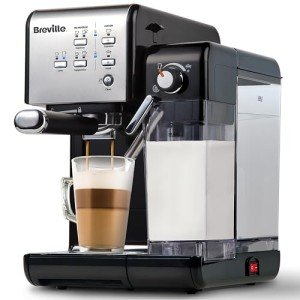The World of High-Quality Espresso Machines: A Comprehensive Guide
Espresso has become a cherished beverage amongst coffee enthusiasts worldwide, known for its rich taste, extreme aroma, and versatility. The heart of a great espresso depends on the machine used to brew it. Latte Machines -quality espresso machines are designed to deliver the ideal shot, making them a necessary financial investment for coffee lovers. This post checks out different types of high-quality espresso machines, their features, upkeep pointers, and responses to frequently asked concerns.
Types of High-Quality Espresso Machines
High-quality espresso machines fall under a number of classifications, dealing with different preferences, skill levels, and budget plans. The primary types consist of:
| Type of Machine | Description | Suitable User |
|---|---|---|
| Manual Espresso Machines | Requires user skill to control extraction and pressure. Provides the most control over the brewing procedure. | Experienced baristas and lovers |
| Semi-Automatic Machines | Combines manual operation with automation. Users manage the grind and tamping, while the machine deals with water dispersion. | Intermediate users |
| Automatic Espresso Machines | Automate the brewing process, permitting programmable developing times and temperatures. | Casual coffee drinkers |
| Super-Automatic Machines | Have built-in grinders and are fully automated, managing everything from grinding to brewing and steaming. | Users looking for benefit |
| Commercial Espresso Machines | Developed for high volume use in coffee shops and restaurants, providing durability and speed. | Company owner |
Detailed Overview of Each Type
Manual Espresso Machines
- Pros: Complete control over the brewing process; can produce remarkable quality espresso.
- Cons: Requires considerable skill; lengthy.
Semi-Automatic Machines
- Pros: Balanced control, blending manual and automatic processes; exceptional quality espresso is still attainable.
- Cons: Requires some knowledge and experience to master.
Automatic Espresso Machines
- Pros: User-friendly; minimizes the finding out curve while still producing high-quality espresso.
- Cons: Still requires some understanding of coffee-making basics.
Super-Automatic Machines
- Pros: Maximal convenience; little skill required; suitable for people or households who desire coffee without hassle.
- Cons: Higher rate point; may lack the fine-tuning abilities of manual machines.
Commercial Espresso Machines
- Pros: Built for longevity and performance; often includes features for high-volume turns.
- Cons: Expensive; might be overkill for home use.
Secret Features to Consider
When trying to find a high-quality espresso machine, a number of essential functions need to be taken into account:
- Pressure and Pump Type: Look for machines with a minimum of 9 bars of pressure, which is important for extracting the best taste from coffee beans.
- Boiler Type: Single, double, and heat exchanger boilers each impact how the machine performs and the speed of developing.
- Construct Quality: High-quality materials such as stainless-steel are more suitable for durability and aesthetic appeals.
- Alleviate of Use and Cleaning: Some machines require comprehensive cleansing, while others are developed for easy upkeep.
- Temperature Control: Consistent temperature level is important; consider machines with PID controllers for precise control.
Advantages of High-Quality Espresso Machines
Buying a high-quality espresso machine provides a plethora of advantages:
- Superior Quality: High-end machines enable higher control, resulting in tastier espresso.
- Durability: Built to last, quality machines require less repair work and replacements.
- Personalization: Users can take pleasure in a customized experience by changing grind size, shot timing, and other settings.
- Increased Convenience: Automatic and super-automatic alternatives permit fanatics to take pleasure in espresso with minimal effort.
Maintenance and Care for High-Quality Espresso Machines
To keep an espresso machine functioning optimally, routine maintenance is vital. Here are ideas for keeping a high-quality espresso machine:
Descale Regularly:
- Use a descaling option every few months to avoid accumulation of minerals from water, which can affect flavor and efficiency.
Clean the Brew Group:
- For machines with a removable brew group, tidy it frequently to guarantee a clean extraction.
Replace Water Filters:
- Use a water filter and alter it as needed to minimize impurities in your developing water.
Daily Cleanings:
- Rinse the portafilter and group head after each use to prevent oil buildup.
Watch on the Parts:
- Monitor seals, gaskets, and other parts for wear and tear and change them as essential.
Regularly Asked Questions (FAQs)
1. What is the best espresso machine for newbies?
For novices, a semi-automatic machine frequently provides a good balance of use and control, permitting users to find out the skills required for making great espresso.
2. Are super-automatic machines worth the investment?
Yes, for those who focus on benefit and ease over control, super-automatic machines can be a worthy investment, specifically for families or busy professionals.
3. How much should I anticipate to invest in a high-quality espresso machine?
High-quality espresso machines vary significantly in price, with manual machines starting at a few hundred dollars, while super-automatic or commercial machines can surpass a number of thousand.
4. Can I make other coffee beverages with an espresso machine?
Yes, many espresso machines have steam wands or accessories that permit users to develop lattes, coffees, and more.
5. For how long do espresso machines generally last?
With proper maintenance, high-quality espresso machines can last over a decade, making them a long-lasting investment in your coffee enjoyment.
High-quality espresso machines yield a transformative coffee experience, whether delighted in at home or in a commercial setting. By understanding the types offered, their features, and the maintenance required to keep them running efficiently, customers can make informed choices that raise their coffee-drinking experience.

